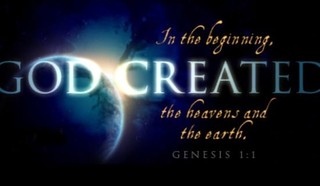- Recent Translations
- All Translations
Genesis 1:31
Share
Settings
Genesis 1:31 in Other Translations
Genesis 1:31 Meaning and Commentary
And God saw everything that he had made
Either all that he had made on the several six days of the creation, he took a survey of them, looked over them again, as workmen do when they have finished their work, to see if anything is amiss or wanting; not that anything of this nature can be supposed in the works of God, but such a survey is attributed to him after the manner of men, to show the completeness of his works, and the excellency of them. Picherellus F17 limits this to what had been done on this day, with respect to man, who alone, as he thinks, was the subject of this day's work; and so it respects the creation of man after the image and likeness of God; the forming of the woman out of his rib, and so providing a suitable helper for him; giving them dominion over all the creatures, and suitable food for the support of the animal life; and God reflected on this, and foresaw it would be good in the issue, as it was in itself.
And behold, [it was] very good;
it had been said of everything else, at the close of each day's work, excepting the second, that it was good; but here the expression is stronger upon the creation of man, the chief and principal work of God, that it was "very good"; he being made upright and holy, bearing the image of his Creator upon him, and in such circumstances as to be happy and comfortable himself, and to glorify God: the phrase may be expressive not only of the goodness of everything God had made, as it was in itself, and in its use; but of his complacency, and delight therein, every thing being made for himself and for, his pleasure, ( Revelation 4:11 )
and the evening and the morning were the sixth day;
by that time all these works on this day were finished; the sun had gone round the earth, or the earth about that, for the space of twenty four hours, which completed the sixth day, within which term of time God had determined to finish all his works, as he did. This day, according to Capellus, was the twenty third of April, and, according, to Archbishop Usher, the twenty eighth of October, or, as others, the sixth of September. Mr. Whiston, as has been before observed, is of opinion, that the six days of the creation were equal to six years: and the Persians have a tradition, which they pretend to have received from Zoroastres, that God created the world, not in six natural days, but in six times or spaces of different length, called in their tongue "Ghahan barha". The first of these spaces, in which the heavens were created, was a space of forty five days; the second, in which the waters were created, sixty days; the third, in which the earth was created, seventy five days; the fourth, in which grass and trees were created, thirty days; the fifth, in which all creatures were made, eighty days; the sixth, in which man was created, seventy five days; in all three hundred sixty five days, or a full year F18. The first of the six principal good works they are taught to do is to observe the times of the creation F19. And the ancient Tuscans or Etrurians allot six thousand years to the creation; the order of which, with them, is much the same with the Mosaic account, only making a day a thousand years: in the first thousand, they say, God made the heaven and the earth; in the next, the firmament, which appears to us, calling it heaven; in the third, the sea, and all the waters that are in the earth; in the fourth, the great lights, the sun and moon, and also the stars; in the fifth, every volatile, reptile, and four footed animal, in the air, earth and water, (which agrees with Picherellus); (See Gill on Genesis 1:25) and in the sixth, man; and whereas they say God employed twelve thousand years in all his creation, and the first six being passed at the creation of man, it seems, according to them, that mankind are to continue for the other six thousand years F20. And it is a notion that obtains among the Jews, that, answerable to the six days of creation, the world will continue six thousand years. It is a tradition of Elias F21, an ancient Jewish doctor, that
``the world shall stand six thousand years, two thousand void, two thousand under the law, and two thousand, the days of the Messiah.''And Baal Hatturim F23 observes, there are six "alephs" in the first verse of this chapter, answerable to the six thousand years the world is to continue: and R. Gedaliah says F24, at the end of the sixth millennium the world shall return without form and void, (to its former condition, "tohu" and "bohu",) and the whole shall be a sabbath: and very particular is another writer F25 of theirs concerning these six days of the creation, who having spoken of the day of judgment, the resurrection of the dead, and the world to come, observes, that the six days' work is an intimation and sign of these things: on the sixth day man was created, and the work was perfected on the seventh; so the kings of the nations shall be in the world five thousand years, answerable to the five days in which the fowls, and creeping things of the waters, and the rest, were created; and the holding of their kingdoms will be a little within the sixth millennium, answerable to the creation of cattle and beasts, who were now created on the beginning of it, the "sixth day"; and the kingdom of the house of David will be in the sixth millennium, answerable to the creation of man, who knew his Creator, and ruled over them all; and at the end of that millennium will be the day of judgment, answerable to man's being judged at the end of it, "the sixth day; and the seventh millennium will be the sabbath". And a like notion obtains among the Persian Magi; it is said that Zerdusht, or Zoroastres, was born in the middle age of the world, so it was told him from the age of Keiomaras (the first man) unto thy age are 3000 years, and from this thy age unto the resurrection are 3000 years F26.
F17 In Cosmopoeiam, p. 2841.
F18 Hyde Hist. Relig. vet. Pers. p. 164, 166, 168, 483, 484.
F19 Lib. Sad-der, port. 6. 94. apud Hyde, ib. p. 439, 483.
F20 See Universal History, vol. 1. p. 64.
F21 T. Bab. Sanhedrin, fol. 97. 1. Avoda Zara, fol. 9. 1.
F23 Comment. in Gen. i. 1.
F24 Shalshelet Hakabala, fol. 36. 1.
F25 Comment. in Maimon. Hilch. Teshuva, c. 9. sect. 2.
F26 Lib. Sad-der, port. 11. Vid. Hyde, ut supra, (Hist. Relig. vet. Pers. p. 481.)




